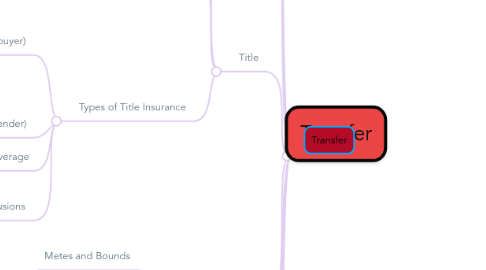
1. Transfer
1.1. Valid Deed
1.1.1. Capacity
1.1.1.1. grantor
1.1.1.2. grantee
1.1.2. In Writing
1.1.3. Granting Clause
1.1.3.1. Action Clause
1.1.3.1.1. grant
1.1.3.1.2. transfer
1.1.3.1.3. convey
1.1.4. Description of the parties
1.1.5. Description of the physical property
1.1.6. Grantor's Signature
1.1.7. Delivery and Acceptance
1.1.7.1. Acceptance
1.1.7.1.1. grantee must accept
1.1.7.2. Intention
1.1.7.2.1. title of pass immediately
1.1.7.3. possession
1.1.7.3.1. of deed by grantee
1.1.8. Not required
1.1.8.1. Acknowledgement
1.1.8.1.1. Required for recording
1.2. Types of Deeds
1.2.1. Grant Deed
1.2.1.1. implies there are no encumbrances other than those revealed
1.2.1.1.1. is the only deed which confers after-acquired title
1.2.2. Quick Claim Deed
1.2.2.1. to quiet title
1.3. Priority of Valid Deed
1.3.1. first valid deed recorded determines ownership
1.3.1.1. Unless prior to recording
1.3.1.1.1. actual or constructive had been given
1.4. Notice
1.4.1. Constructive Notice
1.4.1.1. recording
1.4.1.2. Taking possession
1.4.1.2.1. with unrecorded deed
1.4.2. Actual Notice
1.4.2.1. taken possession
1.5. Title Vesting
1.5.1. Join Tenancy
1.5.1.1. Time
1.5.1.2. Title
1.5.1.3. Interest
1.5.1.4. Possession
1.5.1.5. They can do anything with their interest except will it
1.5.1.6. May sell without permission new buyer often new buyer holds community property
1.5.1.6.1. Disadvantage it can be severed by voluntary transfer or operation of law
1.5.1.7. Rights of survivor-ship
1.5.1.8. Recording a Lien
1.5.1.8.1. Foreclosure lien will sever his particular interest
1.5.1.8.2. will not sever interest
1.5.1.9. Only One Title for all
1.5.2. May hold unequal share
1.5.3. Tenancy in Common
1.5.3.1. Right of Possession
1.5.3.2. May will there share
1.5.3.3. One tenant in common cannot grant an easement
1.5.4. Community Property
1.5.4.1. Husband and wife
1.5.4.1.1. The assumption is CP
1.5.4.1.2. each owns 50%
1.5.4.2. Purchase of real property encumbered by one spouse is voidable within one year by the non consenting adult
1.5.4.3. One party can lease for a period of less then one year
1.5.4.4. One to list; two to sell
1.5.4.5. Statue of Succession
1.5.4.5.1. .5 to spouse; .5 to only child
1.5.4.5.2. .333 to spouse; .666 two children if more than one
1.6. Title
1.6.1. give grantee and heir of a marketable title
1.6.2. Title Plant
1.6.2.1. records of recorded documents by insurance companies
1.6.3. Seller is the trust-or in a preliminary title report
1.6.4. Types of Title Insurance
1.6.4.1. Standard CLTA (buyer)
1.6.4.1.1. Matter of Records
1.6.4.1.2. Lack of Capacity
1.6.4.1.3. Forgery
1.6.4.1.4. Defective Delivery
1.6.4.2. ALTA (lender)
1.6.4.2.1. includes survey and unrecorded events
1.6.4.3. extended coverage
1.6.4.3.1. includes survey and unrecorded events
1.6.4.4. Exclusions
1.6.4.4.1. Defects known by buyer and seller
1.6.4.4.2. Acts by government
1.7. Land Description
1.7.1. Metes and Bounds
1.7.2. Recorded tract
1.7.3. Township and Sections
1.8. Escrow
1.8.1. Make sure conditions of transfer are met
1.8.2. Dual agent for buyer and seller
1.8.2.1. After Escrow agent may become the separate agent of either party.
1.8.3. Broker Escrow
1.8.3.1. Charge fee only if agent to seller or buyer
1.8.3.2. Otherwise needs license Department of Corporations
1.8.4. Seller should order termite Report before listing
1.8.4.1. preventative work is usually paid by buyer
1.8.5. buyer or seller
1.8.5.1. Can authorize changes or cancel Escrow
1.8.6. Only seller can give the buyer permission to move prior to close
1.8.7. Inter-pleader Action
1.8.7.1. unresolved disputes between buyer and seller preventing closing
1.8.7.2. Broker may file if disputes over the deposit before opening of escrow
1.8.8. Closing
1.8.8.1. Selling price is a debit to buyer
1.8.8.2. Prepaid Takes is a credit to seller
1.8.8.3. Assumed loan is a debit to seller and credit to buyer
1.8.8.3.1. Interest on an assumed loan does not appear as a debit to the buyer
1.8.8.4. Recurring cost
1.8.8.4.1. impounds
1.8.8.5. Debit and Credits
1.8.8.5.1. are usually different for buyer and seller
1.8.9. Pro-ration
1.8.9.1. Who is going to pay
1.8.9.2. use 30 day month and 360 day year
1.8.10. Short rate
1.8.10.1. Home owners insurance is cancelled
1.8.10.1.1. refund will be less than a pro-ration
1.8.11. Broker must record a deed within one closing
1.9. Miscellaneous
1.9.1. Notary employee of a corporation
1.9.1.1. may notarize
1.9.1.1.1. when notary has no personal interest
1.9.2. Trust Deeds and re-conveyance deeds
1.9.2.1. Not Deeds
1.9.2.1.1. Loan Documents
1.9.3. Warranty Deed
1.9.3.1. Replaced by Title Insurance
1.10. Tax Aspects
1.10.1. Transfer Document Tax
1.10.1.1. $.55 per $500 of new money
1.10.2. County Tax Assessor
1.10.2.1. assesses the value of all taxable property
1.10.2.2. creates assessment roll
1.10.2.3. Property assessed at 100% of taxable value
1.10.3. County board of supervisors
1.10.3.1. Determine the tax rate
1.10.3.1.1. limited to 1% plus an amount to cover existing debt
1.10.4. Tax collector
1.10.4.1. Prepares the bill
1.10.5. Assessment Appeals Board
1.10.5.1. hears appeals from owners who believed they have been over assessed
1.10.6. Tax Calendar
1.10.6.1. 07/01 to 06/30
1.10.6.2. 01/01
1.10.6.2.1. lien date
1.10.6.3. First installment
1.10.6.3.1. Due 11/01 to 12/10 delinquent
1.10.6.4. Second installment
1.10.6.4.1. Due 02/01 to 04/10 delinquent
1.10.6.5. 06/30
1.10.6.5.1. starts the 5 year lien period
1.10.6.6. Pro-ration
1.10.6.6.1. e.g. sold home in 10/01
1.10.7. Miscellaneous
1.10.7.1. Tax bill does not have legal descriptions
1.10.7.1.1. use tax assessor's parcel number
1.10.7.2. Senior Citizen
1.10.7.2.1. State Controller
1.10.8. Special Assessments
1.10.8.1. Street Improvement Act of 1911
1.10.8.1.1. Specific location tax
1.10.8.2. Mello-Roos act
1.10.8.2.1. More general
1.10.9. Federal Income Tax
1.10.9.1. Basis
1.10.9.1.1. Cost Basis
1.10.9.1.2. Adjusted Cost Basis
1.10.9.2. benefits
1.10.9.2.1. depreciation, 1031 tax defer and installment sales.
